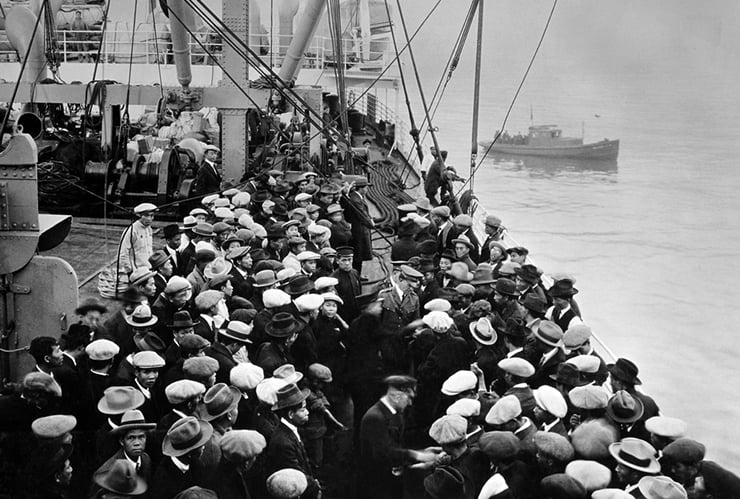Listening to Mike Rowe, Fox News’ advocate for blue collar America, chatting with Brian Kilmeade last week, I was struck by their shared low opinion of early America in comparison to our more diverse and more socially engineered present day country (or empire). According to these conversationalists, the American founders were “imperfect men,” but fortunately we have undergone enormous “progress” since their age. Even better, according to Rowe, “America is under construction and always will be.”
Listening to this paraphrase of a Unitarian hymn about the world getting better every day in every way, I was put in mind of a recently self-published book by a young autodidact with whom I have collaborated on podcasts. In What Happened to America? Joseph Cotto sounds a long lament for the “America of Washington and Jefferson,” and their concept of self-government. Unlike those working for Conservatism, Inc. foundations who offer their own lament, Cotto does not engage in value rhetoric or calls for seminars on virtue.
He is brutally open about his preference for the preponderantly Northern European Protestants who settled early America and what he views as their unique capacity for responsible self-rule. Cotto views these original Americans together with the Indian tribes, who came centuries earlier, with uniform affection. He treats the “old immigrants” who were here by the middle of the 19th century with comparable respect and believes they were easily absorbable into the dominant demographic. (The Irish Catholic immigrants are presented as more problematic, however, because of their long-standing hostile relations with Protestant Anglo-Saxons.)
The main question for Cotto is whether letting in the tens of millions of “new immigrants” who came to the U.S. in the late 19th and early 20th centuries, especially from Southern and Eastern Europe and Asia, benefited this country politically and, in the short and middle terms, economically. Cotto argues these later immigrants exhibited lower median intellectual abilities than the older settlers, but that point is certainly contestable. IQ differences were narrowed or disappeared within a generation after the arrival of these newcomers. Some of the descendants of these immigrants even exceeded the measurable intelligence of the older settlers, but that’s not the main point here. More significantly, the “greenies” (or “greenhorns”), as the newer immigrants were called, drove down the earnings of the indigenous work force, and the owners of industries, like our own corporate capitalists, were happy to avail themselves of this available cheap labor.
Not surprisingly the 1924 Immigration Act, which sought to restrict immigration from poor countries supplying cheap labor, enjoyed the support of labor unions, and especially the enthusiastic backing of Samuel Gomperz of the American Federation of Labor. The consensus today among leftists and neoconservatives is that this law was driven by bigots. Cotto, however, quotes the detailed defense of the National Origins clause of the Immigration Act by Republican Congressman William N. Vaile of Colorado, to refute the frequently heard charge this bill was “racist.”
According to Vaile, race was not a critical issue for those drafting the immigration restriction law. There was, in fact, no restriction on immigration from the New World, including Central and South America. The quotas were constructed for countries that were then overwhelming the U.S. with their poor and uneducated. Our own land, as Vaile explained it, needed time to absorb those from different cultures whom it had already accepted in large numbers, and it needed to assimilate these populations without further disruption to the economy or culture.
Although Cotto tries perhaps overly hard to be provocative in the way he frames his arguments, his exercise in counterfactual history bravely challenges certain platitudes that have been elevated to religious dogma. “America’s diversity is its strength” is an unexamined banality to which Cotto responds, with utter contempt. Another rejected idea is one that Fox News pushes hard, that the U.S. was founded as a deeply flawed country which, over time, became kinder and more humane.
Cotto would properly retort that the U.S. was not created as an unfinished project but had the design and ethnic and cultural composition that its creators wanted. While some of them wanted to end slavery or build infant industries, none had any interest in resettling the country with alien populations in order to “enrich” themselves.
Cotto raises a point about what the future of the U.S. would have looked like, if the waves of “new immigration” had not taken place. He recognizes the problem of social decay and that an America limited to the descendants of the “old immigration” easily could have degenerated into present-day woke Northern Europe. Ancestral virtues would not have necessarily uplifted the present generation; and as we see the onetime mother of Parliaments and bourgeois Protestant civilization across the Atlantic about to hand over its country to the cultural far left, we can grasp the transitoriness of once great civilizations.
Needless to say, none of this can be blamed on the Poles, Sicilians, and Chinese who immigrated here 100 years ago. Once admirable cultures and polities have often contained the seeds of their own destruction; and this, as I try to show in my study of multiculturalism, has happened to varying degrees to WASP America. One should also note that many of this country’s most promising young men died in the American Civil War, just as many of Europe’s best and brightest perished in the carnage of World War I. Those losses may have been irreparable, and the countries affected by them suffered grievously from their effect. But the “new immigration” caused neither of those disasters. By and large it was caused by Northern Europeans or their descendants.

Leave a Reply